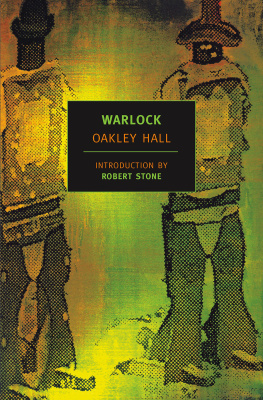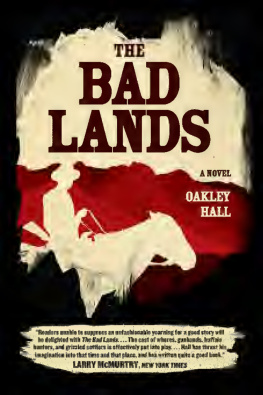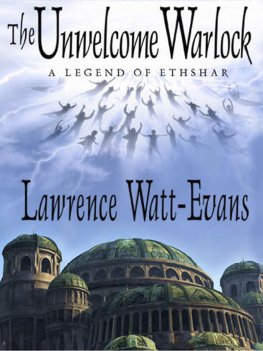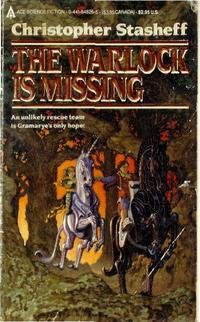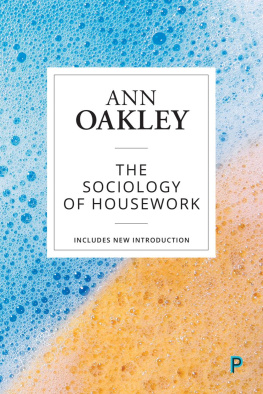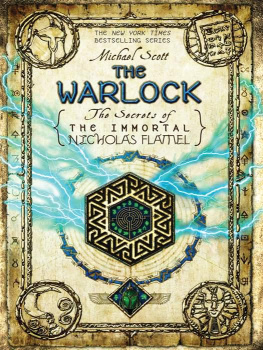Oakley Hall - Warlock
Here you can read online Oakley Hall - Warlock full text of the book (entire story) in english for free. Download pdf and epub, get meaning, cover and reviews about this ebook. year: 0, genre: Detective and thriller. Description of the work, (preface) as well as reviews are available. Best literature library LitArk.com created for fans of good reading and offers a wide selection of genres:
Romance novel
Science fiction
Adventure
Detective
Science
History
Home and family
Prose
Art
Politics
Computer
Non-fiction
Religion
Business
Children
Humor
Choose a favorite category and find really read worthwhile books. Enjoy immersion in the world of imagination, feel the emotions of the characters or learn something new for yourself, make an fascinating discovery.
- Book:Warlock
- Author:
- Genre:
- Year:0
- Rating:4 / 5
- Favourites:Add to favourites
- Your mark:
- 80
- 1
- 2
- 3
- 4
- 5
Warlock: summary, description and annotation
We offer to read an annotation, description, summary or preface (depends on what the author of the book "Warlock" wrote himself). If you haven't found the necessary information about the book — write in the comments, we will try to find it.
Oakley Hall: author's other books
Who wrote Warlock? Find out the surname, the name of the author of the book and a list of all author's works by series.
Warlock — read online for free the complete book (whole text) full work
Below is the text of the book, divided by pages. System saving the place of the last page read, allows you to conveniently read the book "Warlock" online for free, without having to search again every time where you left off. Put a bookmark, and you can go to the page where you finished reading at any time.
Font size:
Interval:
Bookmark:

OAKLEY HALL (19202008) was born in San Diego and grew up there and in Honolulu, where his mother moved after his parents divorce. After graduating from the University of California, Berkeley, Hall joined the Marine Corps and was stationed in the Pacific during the Second World War. Following the war, and with the aid of the GI Bill, he continued his studies in France, Switzerland, and England, returning to the US to receive an MFA in creative writing from the Iowa Writers Workshop. Hall published his first book, Murder City, in 1949 and his last, Ambrose Bierce and the Ace of Shoots, in 2005. In between he wrote more than twenty works of fiction and nonfiction, including the novels The Downhill Racers, Separations, and Warlock, which was a finalist for the Pulitzer Prize in 1958; a libretto for the opera based on Wallace Stegners Angle of Repose; and two guides to writing fiction. Hall was director of the writing program at the University of California, Irvine for twenty years and, in 1969, co-founded the Community of Writers at Squaw Valley, an annual writers conference. Among his many honors are lifetime achievement awards from the PEN Center USA and the Cowboy Hall of Fame.
ROBERT STONE was born in Brooklyn in 1937. He is the author of seven novels: A Hall of Mirrors, the National Book Award-winning Dog Soldiers, A Flag for Sunrise, Children of Light, Outerbridge Reach, Damascus Gate, and Bay of Souls. He has also written short stories, essays, and screenplays, and published a short story collection, Bear and His Daughter, which was nominated for the Pulitzer Prize. He lives in New York City and in Key West, Florida.
WARLOCK
OAKLEY HALL
Introduction by
ROBERT STONE
NEW YORK REVIEW BOOKS

New York
This is a New York Review Book
Published by The New York Review of Books
435 Hudson Street, New York, NY 10014
www.nyrb.com
Copyright 1958 by Oakley Hall
Introduction copyright 2006 by Robert Stone
All rights reserved.
Cover image: Sigmar Polke, Do the World a Favor and Eat a Bullet, 2002; courtesy Michael Werner Gallery, New York and Cologne
Cover design: Katy Homans
The Library of Congress has cataloged the earlier printing as follows:
Hall, Oakley M.
Warlock / Oakley Hall ; introduction by Robert Stone.
p. cm. (New York Review Books classics)
ISBN 1-59017-161-6 (alk. paper)
1. Shooters of firearmsFiction. 2. Social conflictFiction. 3. Social controlFiction. 4. ViolenceFiction. I. Title. II. Series.
PS3558.A373W3 2005
813'.54dc22
2005023653
ISBN: 978-1-59017-823-2
v1.0
For a complete list of books in the NYRB Classics series, visit www.nyrb.com or write to: Catalog Requests, NYRB, 435 Hudson Street, New York, NY 10014.
O NE YEAR in the early Sixties, shortly after I met my literary agent Candida Donadio for the first time, she gave me a novel to read. To my surprise it was a western, by Oakley Hall, a writer of whom I had heard good things. The last western I had read was a book of Zane Greys about hunting mountain lion somewhere around the Grand Canyon. I had no idea what I would think.
I remember thinking how wonderfully clear the book was. Not only clear, as I remember, but full of light. The sensation of reading back into time was very strong because the style made itself invisible as good style will when it is accomplishing its purpose.
Rereading Warlock I found again the light I remembered, an afternoon brightness, a clarity that is, I think now, the essence of good realism. In an almost literal way it illuminated the characters. When it focused on individual lives it seemed to vary its distance from each character as though there existed a different extension of sympathy or a withholding of it for different individuals in the narrative. The light I guess I had recognized the first time as western light. Big Sky light. Realism, I had thought at that time. This is good realism. And I became aware of the skill, the strategy of placing one line upon the other.
Now I knowI think I knowthat modalities like realism, magic, hyper, or otherwise, have only the vaguest application. Nothing is real; life is life and language is language. Really excellent prose like Oakley Halls is the creation of sound, of songs, unheard, which, as they say, can be very sweet. Overall I felt the artistry at work, or maybe I should say at play. But at the core of Warlock was something stronger and more mysterious.
Years ago Richard Slotkin wrote the third, concluding volume of his work on the mythology of the American frontier. Published in 1973, the final section bore a title intensely evoking the era of the trilogys compositionthe Vietnam War and its inglorious concluding years. The title is Gunfighter Nation.
Slotkins books on the frontier are very wise and insightful. They are particularly relevant to the work of Oakley Hall and, of course, to Warlock. If I had read the title presenting America as a gunfighter nation a few years ago I would have believed that it bore the ugly mark of the domestic conflict over the Vietnam War. Perhaps too deeply. The country in its cowboy suita double disguise behind which lurks a posture of innocence and of menace, infantile self-deception enhanced by cheap theatrics. The contemptuousness is very nearly savage.
In fact, though, the professors arraignment by nomenclature is far less facile, trivial, or even sarcastic than it seems. Slotkins work is scholarly, and it sets out to untangle the strands of myth and mytho-poetics in Americas perception of itself. Much of the energy of the study goes into examining American mythmaking and defining different kinds of myth. At one point Slotkin quotes the great master and observer of myth D. H. Lawrence, a stranger in a strange land:
But you have there the myth of the essential white American. All the other stuff, the love, the democracy, the floundering into lust are a sort of by play. The essential American soul is hard, isolate, stoic and a killer. It has never yet melted.
Slotkin uses this citation to distinguish between the kinds of created mythologies America characteristically requires to do what it has to do. The good sheriff, a strong peaceful man; this is pop myth. The killer-stoic who lurks just below the surface of an essential collective consciousness is the real thing. No one realizes this better than Oakley Hall.
Warlock recounts a series of violent events in and around a town of the same name set in a southwestern territory during the 1880s. The account, placed partly in a fictional characters journal, is an examination of the deeper portending of these events. Goodpasture, the diarist, reflects on the balance of justice in the light of which the first series of killings might be viewed. A deputy has buffaloed a local cowboy on a drunken spree, beaten him and inadvertently caused his death. Eventually avengers come and succeed in settling the score. Things like this happen, Goodpasture writes, in this rough-and-tumble corner of creation... happen... and are usually considered no more than too bad.
The rough-and-tumble corner of creation referred to is the American frontier in the last decade of its formal delineation, for the frontier will be officially terminated by the Department of the Interior in 1890. In fact, as the diarist knows but denies, nothing in this last resort of misfits, opportunists, professional killers, and impossibly long odds gamblers is ever accepted in fact as no more than too bad. An overriding and thoroughly hopeless necessity to come out ahead, to come out ahead of the next strong man or of precarious things themselves, drives everyone as they put one more day of frontier existence on top of the last.
Font size:
Interval:
Bookmark:
Similar books «Warlock»
Look at similar books to Warlock. We have selected literature similar in name and meaning in the hope of providing readers with more options to find new, interesting, not yet read works.
Discussion, reviews of the book Warlock and just readers' own opinions. Leave your comments, write what you think about the work, its meaning or the main characters. Specify what exactly you liked and what you didn't like, and why you think so.

